
 |

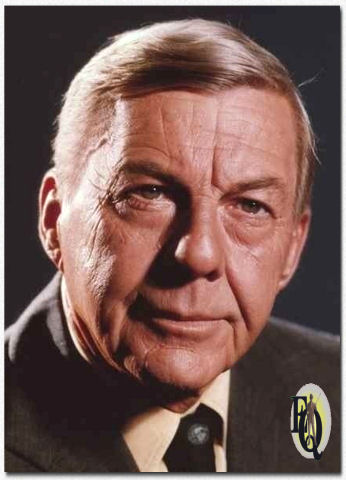
Click on top to return to List of Suspects
Click on bottom to return to List of Suspects NBC
|
|
|
|
Length: 5' 9" (1,75 m) Weight: 135 lbs. Eyes: brown Hair: blonde-brown Marriage: Jane Gordon Trix, (Dec 20. 1941 - Apr 16. 1993, her dead) Twin daughters: Susan Kearney (Jun 27. 1946 - 2019) Melinda (Jun 27. 1946 - ) Son: Timothy (1948 - Aug 1970) Sibling: James Teal McMeekan (Jul 16. 1911 - Jan 26. 1984) |
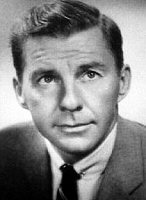 |
| Above right: Theatre photo of a young David Wayne. | |
|
David Wayne was born
Wayne James McMeekan (McKeekan) on January 30. 1914
in Traverse City***, Michigan. Life started on a sad note when his mother Helen Matilda Mason died
(Jan 13. 1919) when he was nearly five years old. He
was cared for by Al and Lena Hodgman. "They were friends of my
father's, but I called them 'Uncle Al' and 'Aunt Lena." "I had
a very happy home life," he later recalled. His father
John David McMeekan supported the family as an insurance agent. Looking backward, Wayne saw
himself as "an extremely gay child'' with "moods of
withdrawal" where he would retreat into reading. "My tastes were extended in college by a very remarkable man, Herbert Slusser, my English professor." He steered him into new horizons. Slusser recommended J.B. Priestley's book about actors, The Good Companions. Wayne always thought that novel helped him to supply an impetus toward the theatre. Low finances forced Wayne to
leave Western Michigan after two years, but he didn't regard his
departure as a tragedy. "Large cities and populations excited me,"
he reported. "I was constantly bumming rides to them. So I was an
abominable student, because I was much more interested in people than in
study." His campus activities left Wayne with little reverence for
the groves of academia: "Actually, an actor, if he has the taste and
the capacity, will gain a liberal education anyway. And what he can
learn in college of a technical sort will be of very little use to him
in the theater." So David Wayne first raised his voice during an extended apprenticeship at the Cleveland Playhouse in a wide variety of roles. He won the role of Touchstone in As You Like It (1935, Cleveland). After two years, after driving to Chicago for an audition, Wayne gave up his double life. He quit business entirely in 1936 when the Shakespearean repertory company set up shop at the Cleveland Great Lakes exposition, giving 600 performances of the Bard's work in 100 days. The company, "Players of the Old Globe," presented 14 Shakespeare plays in a streamlined format of 45-60 minutes each in a replica of Shakespeare's Old Globe Theatre. Wayne was seen in Julius Caesar, The Comedy of Errors, As You Like It, A Midsummer's Night Dream and King Henry VIII. After this, he trouped with a marionette show "Tatterman Marionettes" particularly with Jason and the Golden Fleece and their elaborate (with 44 marionettes and 11 scenes, probably the most ambitious puppet production ever) Peer Gynt (1937) until he reached New York and his first Broadway play. |
|
|
Arriving at Times Square in 1937 with the traditional loan in his pocket, he managed to get his first part without undergoing the customary series of professional and personal crises that later make good reading in the back pages of theater programs. He played it safe. He got an advertising man to sponsor him. In 1938, he made his first New York stage appearance in Escape This Night (44th Street Theatre, Apr 22. - 30. 1938). "Everything escaped, even the audience and I was out on the street in a week. I did commercial recordings and some radio; it kept body and soul together, but I was hungry oftener than not until I got the part of Fredric March's son in 'The American Way'. That job made me a Broadway actor." In 1938, while rehearsing The Animal Kingdom for a summer stock company in Whitefield, New Hampshire, called Chase Barn Players, he was out front, watching a scene in which he did not appear. "Jane Gordon," he recalled, "an actress who was to be on the bill the following week, came down the aisle. The dress rehearsal stopped while everyone said, 'Here's old Jane.' I found myself immediately enchanted by her—and have been ever since. I found myself trying to give a hell of a performance just to impress her." He succeeded. When after Dance Night (Belasco Theatre, Oct 14. - 31. 1938) Moss Hart hired him to play the son in The American Way (Center Theatre, Jan 21. - Sep 23. 1939) Wayne celebrated by adopting a pseudonym: a combination of his father's given name, David, with his own. Around 1940 Maurice Rosenblatt founded the "New York City Coordinating Committee for Democratic Action". The group had a twofold agenda: to mobilize Americans against Nazi racism and to promote fair treatment for blacks in Harlem. The committee through a network of agents, gathered information and published it in its magazine, The City Reporter. Rosenblatt's agents included Stuart McClure, a would-be writer, and Jane Gordon. Jane recruited her boyfriend David McKeekan. According to the census April 1940 Jane and David lived on the same address. The Committee was discontinued in 1945. David would later remember Maurice "who almost got me killed trying to save the Jews!" He tried to enlist in the Army. He was rejected because he had been blind in one eye since birth. Rejected by the army he volunteered as an ambulance driver for the British (8th Army) in North Africa. Two weeks before being shipped out to Europe on December 20. 1941 he married Jane Gordon Trix, daughter of Jean Gordon of the Metropolitan and actress, in "The Little Church Around the Corner" (Andy Levine, from Kalamazoo was his best man). They had been playing in summer stock and knew each other quite a while. The couple would have a son and twin daughters. In the line of duty, the ambulance of Lee Kyle and Wayne McMeekan was blown up in a minefield, but both escaped miraculously. He was erroneously reported as being killed in action when the Germans were victorious at the Battle of Tobruk in North Africa. Returning here, he appeared in a revival of The Merry Widow (Majestic Theatre, Aug 4. 1943 - May 6. 1944). After the U.S joined the war he served in the US Army, he was assigned to officer's training school at Camp Lee, Virginia, where he was commissioned a lieutenant. David Wayne's first* appearance on the screen was as the pilot of a ditching B-17 in Ditch and Live (United States Army Air Forces, 1944) a lesson in sea evacuation for pilots disguised as a drama. He caught the eye and won the approval of Broadway's critical magistrates with a remarkable performance as Conscience in Peep Show (Fulton Theatre, Feb 3. - 26. 1944) and as Mr. Meacham in Park Avenue (Sam S. Shubert Theatre, Nov 4. 1946 - Jan 4. 1947). |
|
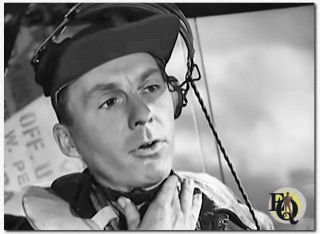 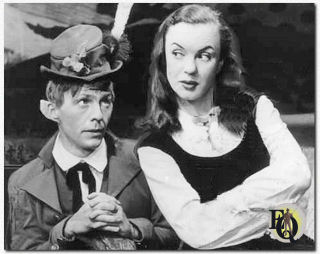 Above left: David Wayne's first* appearance on the screen was as the pilot of a ditching B-17 in Ditch and Live (United States Army Air Forces, 1944). Above right: Ella Logan, musical comedy actress stars with David Wayne in the hit Broadway musical Finian's Rainbow (46th Street Theatre, Jan 10. 1947 - Oct 2. 1948). |
|
|
In 1947 he landed the role that was to prove the sine qua non of his career.
It
was as Og
the leprechaun in the Irish fantasy Finian's Rainbow
(46th Street Theatre, Jan 10. 1947 - Oct 2. 1948), and
its magical musical moments and satire brought him his first Tony, the first
actor to do so ever. Next he
introduced the world to everyone's favorite military innocent, Frank Thurlowe Pulver,
the precocious ensign in Mr. Roberts in 1948.
It was as Pulver that he first appeared opposite Henry Fonda with a crew
haircut, a style that remained his signature for many years. One
place where they evidently did know what to do with Wayne was
television, where he worked steadily from his
TV debut Great Catherine (May 2.
1948) onward. While all of his major stage roles went to other actors in the film versions, Wayne enjoyed a substantial movie career of his own. During the success of the Broadway play Mister Roberts (Alvin Theatre, Feb 18. 1948 - Jan 6. 1951), he was invited to Hollywood for parts in two highly touted films, the first filmed in N.Y. Portrait of Jennie (Selznick Studios, Dec 25. 1948) and Adam's Rib (MGM, Nov 17. 1949). |
|
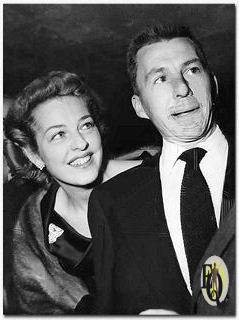 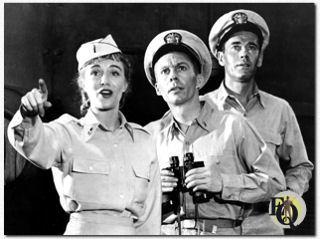 Above left: David Wayne with his wife Jane Gordon (date unknown, 40s) Above right: (L-R) Jocelyn Brando, David Wayne and Henry Fonda in the Broadway play Mr. Roberts (Alvin Theatre, Feb 18. 1948 - Jan 6. 1951). David Wayne played Frank Thurlowe Pulver, the precocious ensign. |
|
|
In a 1950 interview David said his hobbies were golf, tennis, swimming, painting his children, his wife, and his career. Of motion pictures he says: "I am not at all convinced the actor has enough responsibility of creation in films. It is too much a technician's field. That is why I think the movie actor should return to the theater from time to time to enrich himself." |
|
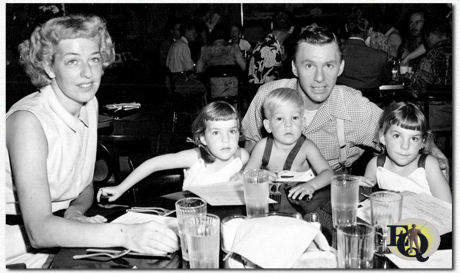 Above: "Actor ages 56 years in new role. Actor David Wayne, who ages from 21 to 77 for his role in a new Hollywood production is shown as he is off-screen, with his family in the studio commissary. Left to right: Mrs. Wayne; Melinda, 5; Tim, 4; and Susan, 5. " (Nov 25. 1951) |
|
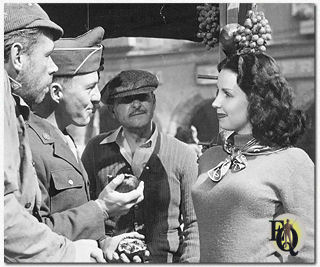 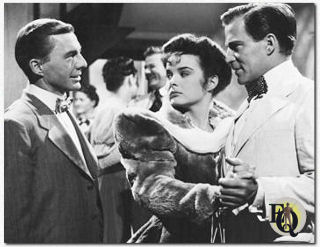 Above left: Tom Ewell, David Wayne, and Marina Berti star in World War II film Up Front (Universal, Mar 5. 1951). Above right: Wait Till the Sun Shines, Nellie (20th Century Fox, Jun 27. 1952) puts David Wayne in the same scene as Helene Stanley and Hugh Marlowe (of Ellery Queen fame!). |
|
|
His motion picture roles proved as varied a blend as
his stage work, from a small-town barber who ages 56 years in the 1952
underrated film Wait
Till the Sun Shines, Nellie
(20th Century Fox,
Jun 27. 1952), a hillbilly in With a Song in My Heart
(20th Century Fox, Apr 4.
1952) to theatrical impresario Sol Hurok in Tonight We Sing
(20th Century Fox, Jan 26.
1953). He did three co-starring stints with Marilyn Monroe in As Young as You Feel (20th Century Fox, Jun 15. 1951), We're Not Married (20th Century Fox, Jul 11. 1952), and as a landlord in How to Marry a Millionaire (20th Century Fox, Nov 20. 1953). |
|
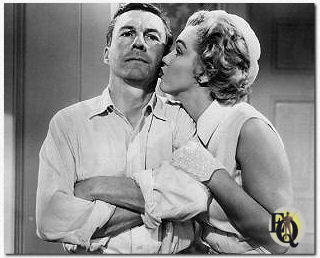 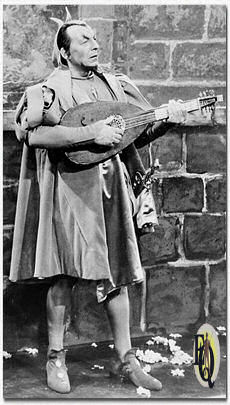 Above left: Not once but thrice! Wayne with Marilyn Monroe in We're Not Married (20th Century Fox, Jul 11. 1952). Above right: Wayne in Tonight We Sing (20th Century Fox, Jan 26. 1953). |
|
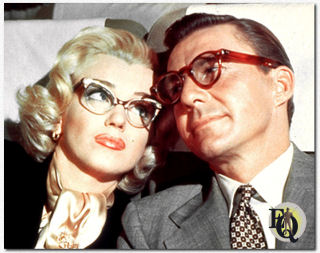 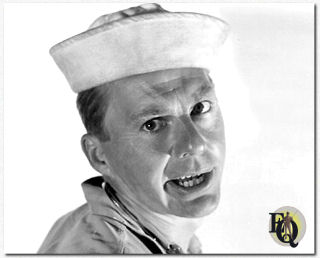 Above left: Who wouldn't envy David Wayne as the landlord in How to Marry a Millionaire (20th Century Fox, Nov 20. 1953) next to Marilyn Monroe. Above right: David Wayne as jolly good crew fellow in Hell and High Water (20th Century Fox, Feb 1. 1954). |
|
He again won a Tony in 1954, this time as best actor in The Teahouse of the August
Moon (Martin Beck Theatre, Oct 15. 1953 - Mar 24. 1956), where he portrayed Sakini the clever Okinawan bent on melding
cultures. He co-starred with John Forsythe in the play and it won that
year's Pulitzer Prize for drama and the Drama Critics' Circle award.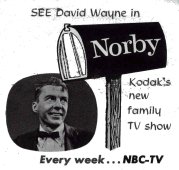 He starred as bank vice president Pearson Norby in the TV series
Norby (NBC, 13 episodes starting
Jan 5. 1955) in the same year where he played opposite Frank Sinatra
in The Tender Trap (MGM, Nov 4. 1955). Wayne
plays a family man obsessed with striking gold in the low budget western The Naked
Hills (La Salle, Jun 17. 1956) with Myrna Dell. He starred as bank vice president Pearson Norby in the TV series
Norby (NBC, 13 episodes starting
Jan 5. 1955) in the same year where he played opposite Frank Sinatra
in The Tender Trap (MGM, Nov 4. 1955). Wayne
plays a family man obsessed with striking gold in the low budget western The Naked
Hills (La Salle, Jun 17. 1956) with Myrna Dell. |
|
| Above right: Station advertisement for NBC's Norby, The sponsor of the show KODAK filmed the show in color making it one of, if not THE, first sitcom to be filmed in color. However, due to the fact that most TVs were still black and white most people had no idea that the filming was actually done in color. | |
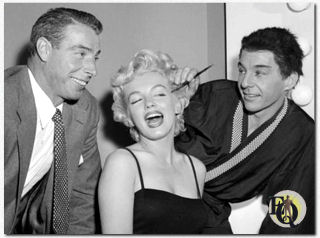 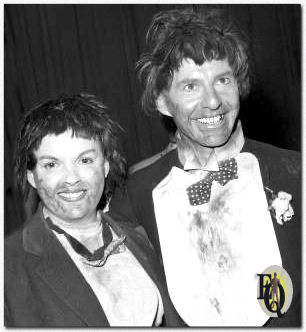 Above left: Joe DiMaggio and Marilyn Monroe pay a backstage visit (1954) to David Wayne during a performance of The Teahouse of the August Moon (Martin Beck Theatre, Oct 15. 1953 - Mar 24. 1956). Above right: Ford Star Jubilee - The Judy Garland Special (Sep 24. 1955). She performs "A Couple of Swells" from her film Easter Parade, with guest David Wayne portraying the role originally done by Fred Astaire in the film. |
|
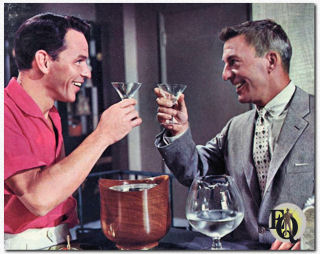 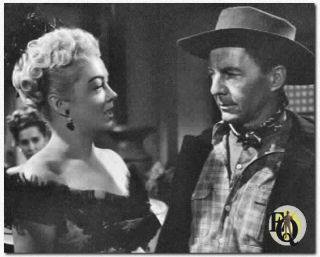 Above left: Opposite Frank Sinatra in The Tender Trap (MGM, Nov 4. 1955). Above right: Myrna Dell and David Wayne in The Naked Hills (La Salle, Jun 17. 1956). |
|
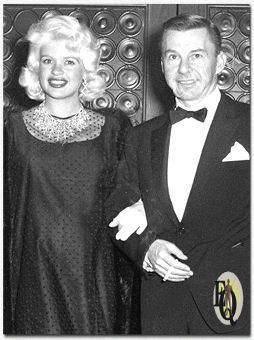 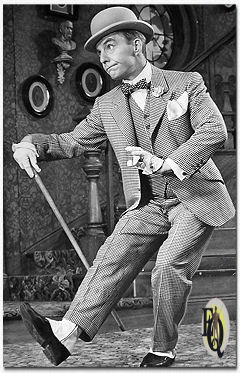 Above left: Jayne Mansfield with David Wayne (ca. 1956) Above right: Wayne as Mr. Finnegan in The Loud Red Patrick (Ambassador Theatre, Oct 3. - Dec 22. 1956). |
|

|
He appeared in lead in the classic episode
"One More Mile To Go"
(Apr 7. 1957) of Alfred Hitchcock Presents. Wayne portrayed schizophrenic Joanne Woodward's long-suffering husband in Three Faces of Eve (20th Century Fox, Sep 18. 1957). Una Merkel, who co-starred with Wayne during his Fox years once said "I loved David Wayne. I think he's one of the finest actors we have. He's so good they don't know what to do with him." In 1957 Wayne was nominated for an Emmy for an appearance in the "Heartbeat" episode (Shamley, Nov 11. 1957) of Suspicion, a suspense anthology. Thinking he has been cured of a heart condition, as his test results were mixed up with those of another patient, James Merrick goes to celebrate, by spending the day at an amusement park. There he meets younger Emily, and they proceed to enjoy the park's many activities, unaware they could prove fatal. |
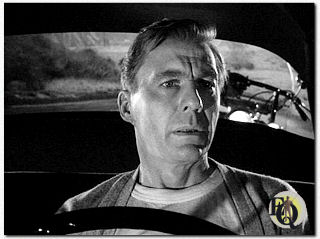 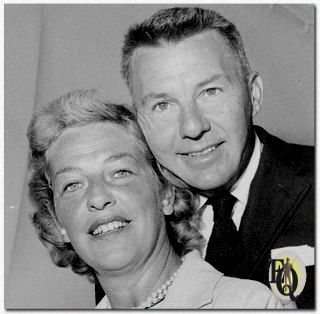 Above left: During a quarrel, a man kills his wife with a fireplace poker, then stashes her body in his car trunk. A motorcycle cop stops him and insists that he fix his broken taillight. "One More Mile To Go" (Apr 7. 1957) with David Wayne was an episode of the popular Alfred Hitchcock presents directed by the master himself. Above right: David Wayne, returning home with his wife after European Vacation (Aug 14. 1957). |
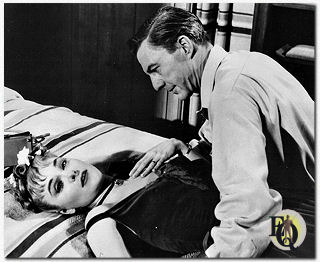 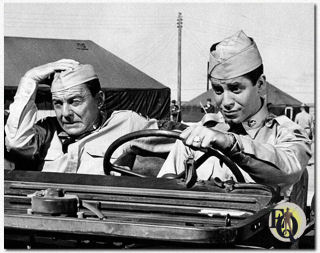 Above left: Wayne portrayed schizophrenic Joanne Woodward's long-suffering
husband in Three Faces of Eve (20th Century Fox, Sep 18. 1957).
Above left: Wayne portrayed schizophrenic Joanne Woodward's long-suffering
husband in Three Faces of Eve (20th Century Fox, Sep 18. 1957).Above right: In Sad Sack (Hal Wallis, Nov 27. 1957) with Jerry Lewis. |
|
In 1958 he won accolades from the critics for his Broadway performance in
Say Darling
(Anta Theatre, Apr 3. 1958 - Jan 17. 1959) with
Vivian Blaine. In the movie The Last Angry Man
(Fred Kohlmar, Oct 2. 1959) with Paul
Muni David played a troubled television producer fighting to preserve his
career. As part of the Theatre Guild, Wayne performed at the Sacandaga Summer Theatre and Westport Playhouse in the comedy-drama Marcus in the High Grass during the summer of 1959. It was a melodrama about a young black man’s search for his biological father only to discover his father is someone he already knows. This was the first play by Bill Gunn, a black independent playwright. Wayne was reported as being "captivated" by the script and "trying to free himself of other commitments" so he could do the play on Broadway. However, the play didn't start there; instead, it premiered off-Broadway (Greenwich Mews Theatre, Nov 21. 1960) with David Wayne and Elizabeth Ashley in the starring roles. Because the actors in the play were white, several of its reviews were unaware that its author was not. In the classic episode "Escape Clause," (CBS, Nov 6. 1959) of Twilight Zone David played a hypochondriac who, in an effort to escape his dependence on pills and fear of his environment, made a pact with the Devil. In exchange for his soul, he won immortality (below left). Besides playing such prominent personages as Andrew Carnegie, Mark Twain he was also "Old Scratch" (with Edward G. Robinson) in a 1960 telecast of "The Devil and Daniel Webster" (NBC, Feb 14. 1960) part of Sunday Showcase. |
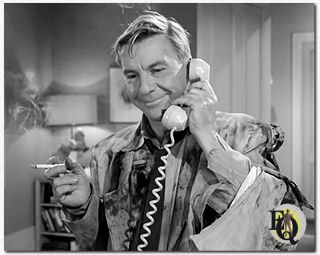 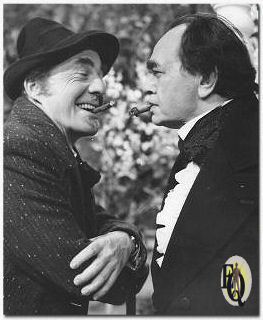 Above left: Wayne in the Twilight Zone episode "Escape Clause". (CBS, Nov 6. 1959) When David Wayne seeks immortality and is willing to trade his soul for it, what could be more enticing? Above right: David Wayne (L) and Edward G. Robinson (R) in a scene for "The Devil and Daniel Webster," Stephen Vincent Benet's classic which was presented on NBC-TV Sunday, February 14. Wayne plays the part of the cheerful Devil. Robinson is Webster, who helps a farmer friend after he sells his soul to the Devil. This was one of Robinson's rare television appearances. |
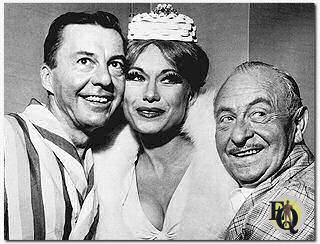 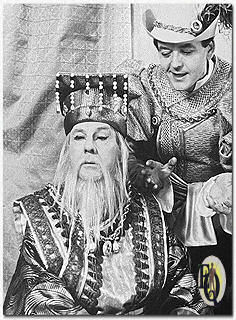 Above left: Squeeze play for 'Venus' - Joyce Jameson, feminine lead in the Broaway comedy Venus at Large, (Apr 11. and Apr 12. - Apr 14. 1962) finds herself in close quarters with actors David Wayne (L) and Ernest Truex after opening performance tonight. Scene is backstage at the Morosco Theater. The actors have supporting roles onstage as well as backstage. Above right: David Wayne as "Kublai Khan" with Hal Holbrook in Marco Millions (Anta Washington Square Theatre, Feb 20. - Jun 18. 1964) |
|
Whilst appearing regularly in multiple TV series, his
career in the early sixties was characterized by a series of plays on
Broadway: Send Me No Flowers (Brooks Atkinson Theatre, Dec 5. 1960 - Jan 7. 1961); Venus at Large (Morosco Theatre, Apr 11. and 12. - Apr 14. 1962); Too True to be Good (54th Street Theatre, Mar 9. and 12. - Jun 1. 1963); After the Fall (Anta Washington Square Theatre, Jan 23. 1964 - May 29. 1965); Marco Millions (Anta Washington Square Theatre, Feb 20. - Jun 18. 1964); But for Whom Charlie (Anta Washington Square Theatre, Mar 12. - Jul 2. 1964); Incident at Vichy (Anta Washington Square Theatre, Dec 3. 1964 - May 7. 1965); and The Yearling (Alvin Theatre, Dec 1. and Dec 10. - Dec 11. 1965). With the Repertory Theater of Lincoln Center for the performing arts David Wayne performed with Faye Dunaway, Jason Robards Jr. , Joseph Wiseman, Hal Holbrook,... They played in the Anta Washington Square Theatre, New York City. He was one of the hosts of the NBC weekend radio potpourri Monitor (from early 1963 through early 1966). 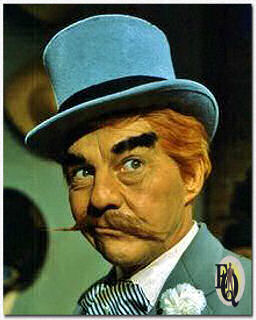 Devotees of the Caped Crusader and Boy Wonder could occasionally see Wayne as the Mad Hatter, a Batman nemesis on TV in 1966 - 1967. (Right) David Wayne was on stage as "Cap'n Andy" in Show Boat the musical by Jerome Kern & Oscar Hammerstein II (The Music Theater of Lincoln Center, 64 performances starting Jul 19. 1966). David played the leading roles, together with Barbara Bel Geddes in Plaza Suite (Parker Playhouse, Fort Lauderdale, Apr 7. - 19. 1969). The production opened February 14. 1968 at the Plymouth Theatre in New York City (with George C. Scott and Maureen Stapleton in the lead) and ran for 1097 performances while simultaneously playing on the road. |
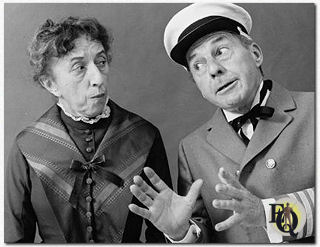 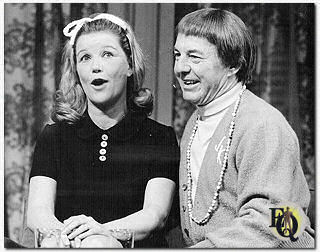 Above left: "Cap'n Andy" on stage in Show Boat, the musical written by Jerome Kern & Oscar Hammerstein II (1966), here with Margaret Hamilton (as Parthy Ann Hawks). Margaret is forever associated with her role as Miss Gulch/Wicked Witch of the West uit The Wizard of Oz. Above right: Long before Dallas, David Wayne and Barbara Bel Geddes were seen together in the play Plaza Suite (Parker Playhouse, Fort Lauderdale, Apr 7. - 19. 1969). |
|
His son Timothy Wayne, disappeared and was presumed drowned while
canoeing with a friend near Yellowknife, in Canada's Northwest Territory, in
August 1970. The Royal Canadian Mounted Police discovered an overturned
canoe, two life jackets and two paddles but no bodies. As Dr. Dutton he was trying to find a cure for the Andromeda Strain in 1971 (below left). For David Wayne's one man show An Unpleasant evening with H.L. Mencken (Ford Theatre, Washington D.C. Mar 8. - 26. 1972) the National Parks Service, which, owned Ford's, suggested that certain derogatory references to the South be deleted. Paul Shyre, the author‐director complied with some suggestions but insisted that other lines remain. David Wayne, still referred to Mississippi as the “bunghole of America,”. The retention one might say, was a victory for free Speech. The fact was that the Show was not a victory in any other sense. He was the duke in a 1974 remake of Huckleberry Finn (below right). On the big screen he performed in The Front Page (Universal, Dec 18. 1974), and The Apple Dumpling Gang (Walt Disney, Jul 1. 1975). |
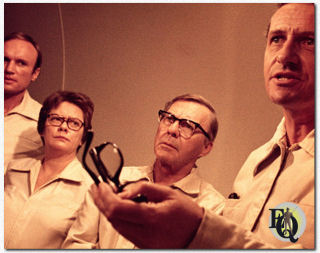 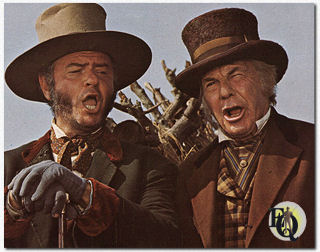
Above left: David Wayne as Dr. Dutton in the Andromeda Strain in 1971. Above right: Wayne in a 1974 musical remake of Huckleberry Finn. |
|
|
| Above right: TVue - December 7. 1975: David Wayne. |
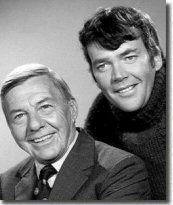 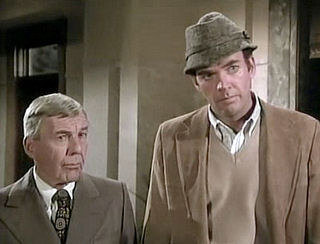 Above left: Publicity shot of the 'Dynamic Duo' David Wayne & Jim Hutton for Ellery Queen (NBC, 1975 - 1976) Above right: In Ellery Queen there was remarkable chemistry between Hutton and Wayne, forming a robust and convincing duo, seamlessly complementing each other's performances. |
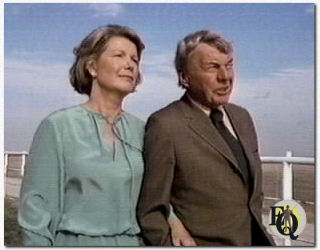 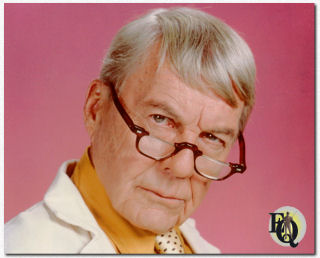 Above left: Miss Ellie (Barbara Bel Geddes) and Digger Barnes (David Wayne) at a Southfork BQQ in Dallas (1978) “Then, I married Jock for money. Well, let’s get back to the party.”. Above right: Dr. Amos Weatherby (David Wayne) in House Calls (1979 - 1982). |
|
In 1977 he moved to Los Angeles. Most of the public now
will remember him as Willard (Digger) Barnes on Dallas (1978)
(above left) the alcoholic stepfather of Pamela Ewing, known for his
beautiful voice and modern interpretive dance skills, which were masterfully
showcased at the Ewing Barbecue when he performed "The Yellow Rose of
Texas" (see media link 7 below).
Curtailing his activities in the late 1980s, David Wayne
retired altogether in 1993, after the death of his wife of 51 years. His Broadway, TV and film portrayals ran a gamut of characters ranging from a scientist trying to save the world to an ingenuous Asian bent on bringing happiness to GIs in a far-off land. He passed away in Santa Monica, California February 9. 1995 from lung cancer. He was 81 years old. David Wayne made Stanislawsky's credo his own: "Love
the art in yourself rather than yourself in the art." |
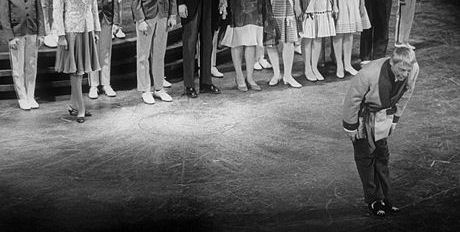 |
|
Notes: * IMDb lists his first appearance in film for Stranger on the Third Floor (1940) in which he is said to play a cab driver. However, scrutiny of the film reveals that this is not David Wayne but Elisha Cook Jr. **His last on screen appearance was possibly in the movie The Fence in April 1994 as a Steel Mill Foreman. *** Some sources name (near) Paw-Paw, Michigan as his birthplace. Possibly referring to Bloomingdale, the place where the Hodgmans lived. All dates for movies are for the first US release. All dates for TV programs are original first airdates. All dates for (radio) plays are for the time span the actor was involved. Facts in red still need confirmation. |
|
Click on Uncle Sam if you think you can help out...!
|
|
Other references
Additional video & audio sources
|
|
This actor profile is a part of
Ellery Queen a website on deduction.
The actor above played Richard Queen in the
1975-1976
Ellery Queen TV series.
Click Uncle Sam if you think you can help
out...! Many of the profiles on this site have been compiled after very careful research of various sources. Please quote and cite ethically! |
|
Page first published before May 27. 2016 Version x2.2 - Last updated April 23. 2025 |
 b a c k
t o L i s t o f S u s p
e c t s
b a c k
t o L i s t o f S u s p
e c t s
b a c k
t o L i s t o f S u s p
e c t s N B C
|
|
| Introduction | Floor Plan | Q.B.I. |
List of Suspects | Whodunit? | Q.E.D. | Kill as directed | New | Copyright Copyright © MCMXCIX-MMXXV Ellery Queen, a website on deduction. All rights reserved. |